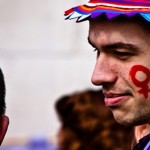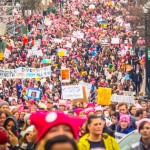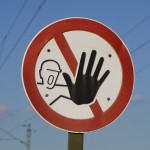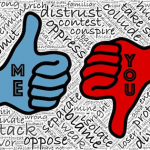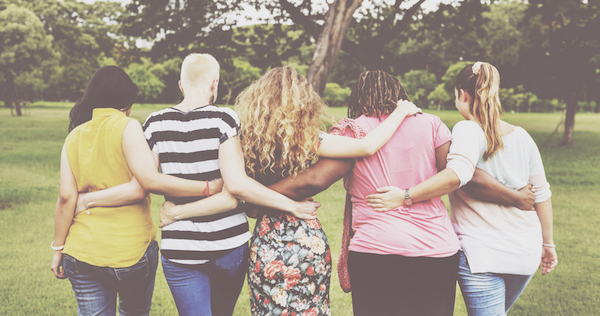
LIBBY ANNE, blogger at Love, Joy, Feminism (atheist): I’ve always lived in the Midwest. I grew up in a large evangelical homeschool family, and today attend a Unitarian Universalist church and identify as nonreligious. But I’ve found over the years that I share my core values with other feminists, and those who promote other forms of equality, not necessarily those who share my specific religious beliefs (or lack thereof). My upbringing was very patriarchal, and embracing gender equality has perhaps changed my life more than any other belief I’ve changed.
REBECCA BRATTEN WEISS, blogger at Suspended in her Jar (Catholic): I live in Ohio, after many wanderings. I’m a Catholic feminist with roots in both Judaism and Protestantism, and I’m interested in interacting with other feminists from different backgrounds and traditions, especially when it comes to activism for women’s rights and ecological concerns. I farm part time, and lecture in English literature and occasionally philosophy.
SAMAR KAUKAB, executive director of Arete at the University of Chicago (Muslim): I live in the South Side of Chicago and grew up in Ohio the child of Pakistani immigrants. I’m a Muslim who is working on figuring out what the intersections are between my faith and my feminism as a woman of color. I also have three children, ages 9, 8, and 4.
ERIN WATHEN, blogger at Irreverin (Progressive Christian): I am the Senior Pastor at Saint Andrew Christian Church–a progressive church in the Kansas City area. I served a church in Phoenix before moving here; and am from Kentucky before that. I’m married and have 2 kids–ages 5 and 7.
What was your own path toward identifying as a feminist? Was it a term that came easily to you?
Samar: I’m not sure if I found feminism or if it found me, but what I do know is that my mother, a physician and active member of the Muslim community in Cincinnati had a formative impact upon on me as a child. Growing up, I both struggled with and adored the fact that my mother worked while most of my peers had stay at home mothers. My experiences watching my mother navigate the complexities of working motherhood and being a leader in male-dominated spaces coupled with the stories I heard about dynamic Muslim women throughout history both directly contradicted much of what I actually saw in terms of the role of and space given to Muslim women. That cognitive dissonance between the values I had been raised with at home and what was actually happening in my community accelerated my own pathway towards a feminism that could reconcile my own complex identity.
Fast forward several years and my work in anti-sexual violence advocacy, as well as my own personal journey as a woman pursuing a career, having children (especially daughters), and then subsequently becoming a single mother only further cemented the need for a feminism that helped me to navigate my own needs and life experiences as a Muslim woman.
Erin: I grew up in a small town in southeastern Kentucky. My Disciples of Christ church was progressive for that area. So I grew up pretty sheltered from the fundamentalism of that area. When I was a teenager, I would bring friends to church and they’d be like “your mom serves communion?? That is so cool.” And I was flabbergasted–I had no idea that this was not the norm. So that’s when I became a feminist. I just could not believe that all the other churches in town did not quite think women were whole people and that all of my friends had grown up thinking that’s just how things were.
Rebecca: I’d like to say, one morning I woke up from uneasy dreams and discovered I’d become a feminist (paraphrasing Kafka) – but it was a lot longer and more complex than that. Initially I bought into a lot of stereotypes about feminists, or “straw feminists” – typical when moving in more right-wing religious circles. It took a long time for me to admit that my personal discomfort with masculinity politics and narratives about the kind of being I was supposed to cultivate wasn’t just personal….it was part of a larger movement. Other women had these same thoughts and feelings! It was humbling. How about the rest of you? Especially with religious backgrounds?
Libby Anne: My experience mirrors Rebecca’s much more than Erin’s! I’m sometimes somewhat jealous of those who rejected patriarchal teachings as children, because I didn’t — I accepted every bit of it. I was taught not only that wives are under their husband’s authority but also that adult daughters are under their father’s authority. And I believed it — every bit of it. Then I went to college. While there I became increasingly confident in my own judgement. While there I started dating a young man I’d met there. We initially had my father’s permission, but then my father ordered me to break it off with him and I couldn’t do it. That’s when I rejected the idea of male authority, because it no longer made sense. I was capable of making my own decisions. Why should I simply obey whatever man I was tied to, by blood or law?
But there was another piece that took longer. Even though I now believed that all adults were capable of making their own decisions and that men and women should be equal decision-makers in marriage, I still believed that women were supposed to stay home and care for the children while men went out and earned the money. I thought things were just naturally best that way, that’s how people were suited. This is going to sound ridiculous, but what changed is that I had to bring in extra money to supplement my husband’s income for a time, and I found that I loved working and my daughter loved daycare, and I couldn’t believe it. We were so much happier. I don’t remember when I first used the label “feminist,” because like Erin I had a lot of stereotypes, but that was really when I tied my last loose ends up.
Also, Erin, I can’t imagine my mom serving communion. O_O It was NOT that kind of a church!
Erin: The sad irony is that my home church, after enthusiastically ordaining me, got jumpy about the Disciples stance on LGBT stuff and left the denomination. Turns out they were only progressive to a point. So my mom, and most of the women who raised me, left that church and started a new one…which has since folded 🙁
Rebecca: Libby Anne, were you homeschooled also? I was — and I am actually very grateful, in retrospect, because my mother is an excellent educator. But I see a lot of homeschool communities and they seem very insular, very enforcing of outmoded and often depersonalizing gender roles.
Libby Anne: Yes Rebecca, I was. I was homeschooled from kindergarten through 12th grade. And I watched a lot of moms push themselves into gender boxes that didn’t always fit. One mom we knew had to call her husband to get permission to come over and visit us during a school day (i.e. while homeschooling)! My mom educated me well also, in part because she was well educated herself — she had a career before she had me and chose to stay home. She initially did this just because she preferred it, and only later came to believe it was women’s role to stay home with their children.
Rebecca: Education is so connected with women’s rights — and I know there are still groups that are opposed to college for women! But I also worry that in over-stressing education I sometimes end up denigrating women who have chosen not to go to college.
Samar: The concern about overemphasizing the role of education, particularly in how it might impact women without access to the type of education I had, is something I think about a lot. As someone who grew up here in the West, it strikes me often that there’s a sense infuriating pity that many well-intentioned Westerners have for women from developing countries given the vast inequities women in many of these countries face as it relates to access to good, quality education. I wonder a lot about whether that is helpful or harmful as it can result in a willingness to not even see these women as having full agency.
Libby Anne: I had people tell me I shouldn’t go to college, and express extreme concern to my parents about their decision to send me there. But my parents believed that I should have the ability to have a career in case something happened to my future husband. They didn’t want me with no options if my husband died, or was disabled, etc. They paid for my college (until we were at odds) and referred to that as my “dowry” because they didn’t want my husband to have to pick up my college loans while I stayed home with children.
Rebecca: My mother was very supportive of my education, and helped me graduate early, though I had to go to the college of her choice (Catholic).
Libby Anne: Erin, your point about your church being progressive only up to a point is interesting. I grew up attending a large evangelical megachurch. Women weren’t allowed to serve communion, etc., but they could be active in women’s ministry, or in children’s ministry, or in missions. My parents once tried going to a church with a higher concentration of homeschoolers but my mom couldn’t stand it, she said it felt stifling with its huge emphasis on gender roles — even though she was huge on gender roles! I think churches can sometimes present themselves as progressive, or welcoming, or what have you, without going the whole way, because they can contrast themselves to other churches that are, let’s say, much less open.
What is it like to be a feminist in your community? What particular challenges and opportunities are inherent in being a Catholic feminist, atheist feminist, etc.?
Rebecca: It’s a little like being an under-cover agent, or a missionary, or a little of both: sometimes I’m in under-cover mode, nodding and smiling when people say things that drive me nuts, because one can’t be picking fights with people 24-7, and in the present political climate everyone is a bit tense already. I’m often already on the defensive about economic justice or environmental issues, so I’m afraid everyone will just figure I’m this permanently angry crackpot, and not engage. And I have definitely met with animosity, even downright malice, and attempts to damage my reputation – but, when that happens, I think: some people have far too much time on their hands! And must not be very happy, if they’re trying to damage another human being.
Because, I see so many instances in which women have been conditioned to oppose feminism, and embrace patriarchal hegemonies, and it makes them unhappy – and I want to be able to talk about female equality as a good thing, an ethical thing, a moral challenge. And I want to be able to listen to them, too, because I love hearing the different stories of women, especially young women, who are, like the Ents in The Lord of the Rings, “waking up, and discovering that they are strong.”
The crazy thing is, everything Mary Wollstonecraft wrote in A Vindication of the Rights of Women, two hundred years ago, is still relevant today, which is a tribute to her wisdom, but also very sad, that we’re still confronting the same problems. It’s sad that women (and men too) feel obligated to squeeze themselves into these narrow little stereotypes, and fear so much, when if you look at the lives of the Catholic saints so many of them were so radically individual, counter-cultural, daring, eccentric. The women especially. This is the freedom I think my faith offers, to enter into a relationship with a God who wants us to flourish as unique and loving beings. But people keep reshaping the faith in this very institutional mode, with Christ left out, making the Church into some rigid bourgeois little club. Pope Francis has spoken out on this, and while sometimes I feel that he’s a little old-fashioned on women’s issues, I think his vision of the Church is of one in which we really can pursue holiness and fulfilment as persons, not as automatons under male control – and he’s so wonderful on our relationship to the environment and our communities.
Samar: Being a feminist in the Muslim community often feels like walking around constantly with a football helmet on your head. Sometimes you wear the helmet to shield out the noise — you have to pick your battles. Sometimes you wear it to protect your own self from those who are willing to dismiss and denigrate everything that comes out of your mouth simply based on their assumptions that anyone who is a feminist must also be “secular” in a pejorative way. Anyone who claims both – a Muslim feminism — is well, wrong.
There is also at times a deep frustration, particularly as it relates to the myriad of ways that women in all of our communities are unsafe. Conversations and attempts to address issues like sexual violence, the spiritual abuse of women, domestic violence, space inquities, or a lack of female representation in institutional leadership are often misdirected and sent to the Thanksgiving kids’ table.
Lately, particularly as it relates to the urgency of the election season before, I’ve been hearing a lot from other Muslims about how gender-issues are just not a priority right now for American Muslims. Rather, the idea being that our energy should be directed towards foreign policy issues, the presidential election, and Islamophobia. While I too share that each of the aforementioned issues are significant and urgent, it never stops getting disappointing when my fellow co-religionists are willing to throw issues that relate to gender under the bus due to the current political climate.
Oddly enough, if there is anything that is rising to the surface during this election season it is the issue of misogyny and gender bias in American society at large. So, in effect, I’m not sure if there is a more relevant or urgent issue to discuss than the way that women continue to be deeply impacted by violence and discrimination. Perhaps more importantly, another complex issue that is both an opportunity and a significant challenge centers around intersectionality and what it means to simultaneously experience multiple forms of discrimination such as both sexism and Islamophobia. Couple that with the fact that many Muslim women are Black and Brown and you have the perfect intersectional feminism storm. I really struggle with the idea that there are people in our community who are more than willing to pick up the banner to fight Islamophobia but remain silent when misogyny roars its ugly head. To know that there are fellow Muslims who do not see the interconnectedness between the gendered way that Muslim women in particular have been attacked in recent months is frustrating at best.
Libby Anne: This is a really interesting question. Within the atheist community, I often see an assumption that activism is best focused on secular causes, such as the separation of church and state or the importance of sound science. Feminism is viewed by some atheists as irrational. So if you out yourself as a feminist in atheist circles, there can be a sort of, “oh, you’re one of them,” effect. And other atheists, who wouldn’t go that far, still see feminism as a distraction from causes they view as more important. And on some level, I can see their point. Atheists don’t come together to worship or engage in community rituals, as other communities do. When they come together, it tends to be to engage in secular causes.
Of course, some argue that feminism is a secular cause. And here, too, I can see their point — feminists often find themselves working against religious beliefs and practices. However, in my experience, misogyny and sexism are just as present within atheism communities as they are in religious communities. Further, making religion out to be the problem (rather than sexism and misogyny wherever they occur) risks making it difficult to work together with religious feminists like Rebecca, Erin, and Samar.
For me personally, I don’t see my feminism as stemming from (or related to) my atheism. Yes, the evangelical community in which I grew up was thoroughly patriarchal. But, when I first embraced gender equality, I still identified as religious, and I didn’t see that as a contradiction. It was not my feminism that led me to atheism. In some sense, then, I see the two separately. I am a feminist and an atheist, not an atheist feminist or a feminist atheist.
Image via Shutterstock.




